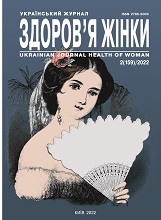Clinical case of SARS-CoV-2-associated myocarditis in pregnant womаn
DOI:
https://doi.org/10.15574/HW.2022.159.33Keywords:
pregnancy, myocarditis, COVID-19 infectionAbstract
The relatively new and little-studied COVID-19 infection, or SARS-CoV-2, is a global public health emergency. Coronavirus infection was originally thought to primarily affect the respiratory system, but current research around the world has confirmed the virus's susceptibility to the cardiovascular system. It is known that SARS-CoV-2 is characterized by multiorgan damage, and cardiovascular damage is no exception. According to the study, problems with the cardiovascular system occur in about 20% of hospitalized patients with COVID-19, also describe the severe consequences of the cardiovascular system in the postpartum period.
Pregnant women are no longer more likely to develop COVID-19, but if they become ill, they need care in the intensive care unit, oxygen support. Such pregnant women have an increased risk of complications due to coronavirus disease.
Purpose - to present a clinical case of a woman who developed post-infectious myocarditis with pulmonary hypertension after COVID-19 infection, which was diagnosed during pregnancy and was considered as an indication for its termination.
Clinical case. Pregnant at 20 weeks, complained of shortness of breath with light exercise, unmotivated fatigue, chest discomfort, pale skin. From the anamnesis it is known that two months before the planned pregnancy, the woman suffered from COVID-19 infection. During the examination in the department, laboratory and instrumental data made it possible to diagnose post-infectious myocarditis with pulmonary hypertension.
Conclusions. Patients with coronavirus infection should be monitored by a physician for a significant period of time to diagnose possible complications in the long COVID period. This is especially true for women planning a pregnancy.
The research was carried out in accordance with the principles of the Helsinki Declaration. The informed consent of the patient was obtained for conducting the studies.
No conflict of interest was declared by the authors.
References
Channappanavar R, Perlman S. (2017). Pathogenic human coronavirus infections: causes and consequences of cytokine storm and immunopathology. Semin Immunopathol. 39: 529-539. https://doi.org/10.1007/s00281-017-0629-x; PMid:28466096 PMCid:PMC7079893
Chen C, Zhou Y, Wang DW. (2020). SARS-CoV-2: a potential novel etiology of fulminant myocarditis. Herz. 45 (3): 230-232. https://doi.org/10.1007/s00059-020-04909-z; PMid:32140732 PMCid:PMC7080076
Clerkin KJ, Fried J, Raikhelkar J, Sayer G, Griffin JM, Masoumi A, Jain SS, Burkhoff D, Kumaraiah D, Rabbani LeRoy. (2020). COVID-19 and Cardiovascular Disease Circulation. 141: 1648-1655. https://doi.org/10.1161/CIRCULATIONAHA.120.046941; PMid:32200663
Cowan LT, Lutsey PL, Pankow JS, Matsushita K, Ishigami J, Lakshminarayan K. (2018). Inpatient and outpatient infection as a trigger of cardiovascular disease: the ARIC study. J Am Heart Assoc. 7 (22): e009683-e009683. https://doi.org/10.1161/JAHA.118.009683; PMid:30571501 PMCid:PMC6404437
Hamming I, Timens W, Bulthuis ML, Lely AT, Navis G, van Goor H. (2004). Tissue distribution of ACE2 protein, the functional receptor for SARS coronavirus: a first step in understanding SARS pathogenesis. J Pathol. 203 (2): 631-637. https://doi.org/10.1002/path.1570; PMid:15141377 PMCid:PMC7167720
Hongde Hu, Fenglian Ma, Xin Wei, Yuan Fang. (2021). Coronavirus fulminant myocarditis treated with glucocorticoid and human immunoglobulin. European Heart Journal. 42, 2 (7): 191. https://doi.org/10.1093/eurheartj/ehaa248; PMid:32236443 PMCid:PMC7813621
Lymanska AU. (2015). Features of pregnancy and childbirth in women with congenital heart disease in accordance with the recommendations of the European Association of Cardiologists. Women's health. Obstetrics. 4: 48-49.
Madjid M, Miller CC, Zarubaev VV et al. (2007). Influenza epidemics and acute respiratory disease activity are associated with a surge in autopsy-confirmed coronary heart disease death: results from 8 years of autopsies in 34,892 subjects. Eur Heart J. 28 (10): 1205-1210. https://doi.org/10.1093/eurheartj/ehm035; PMid:17440221 PMCid:PMC7108465
Madjid M, Safavi-Naeini P, Solomon SD, Vardeny O. (2020). Potential effects of coronaviruses on the cardiovascular system: a review. JAMA Cardiol: е1-е10. https://doi.org/10.1001/jamacardio.2020.1286; PMid:32219363
Madjunkov M, Dviri M, Librach C. (2020). A comprehensive review of the impact of COVID-19 on human reproductive biology, assisted reproduction care and pregnancy: a Canadian perspective. J. Ovarian Res. 140: 13. https://doi.org/10.1186/s13048-020-00737-1; PMid:33246480 PMCid:PMC7694590
Ministry of Health of Ukraine. (2020). Protocol «Provision of medical care for the treatment of coronavirus disease (COVID-19)». Order of the Ministry of Health of Ukraine of April 2, 2020 No. 762, as amended by the order of the Ministry of Health of December 31, 2020 No. 3094.
Sutton D, Fuchs K, D'Alton M, Goffman D. (2020). Universal screening for SARS-CoV-2 in women admitted for delivery. N Engl J Med. 382 (22): 2163-2164. https://doi.org/10.1056/NEJMc2009316; PMid:32283004 PMCid:PMC7175422
Tavazzi G, Pellegrini C, Maurelli M, Belliato M, Sciutti F, Bottazzi A. Arbustini E. (2020). Myocardial localization of coronavirus in COVID‐19 cardiogenic shock. European journal of heart failure. 22 (5): 911-915. https://doi.org/10.1002/ejhf.1828; PMid:32275347 PMCid:PMC7262276
Xin Wei, Yuan Fang, Hongde Hu. (2020). Immune-mediated mechanism in coronavirus fulminant myocarditis. European Heart Journal. 41 (19): 1855. https://doi.org/10.1093/eurheartj/ehaa333; PMid:32320031 PMCid:PMC7188134
Downloads
Published
Issue
Section
License
Copyright (c) 2022 Ukrainian Journal Health of Woman

This work is licensed under a Creative Commons Attribution-NonCommercial 4.0 International License.
The policy of the Journal UKRAINIAN JOURNAL «HEALTH OF WOMAN» is compatible with the vast majority of funders' of open access and self-archiving policies. The journal provides immediate open access route being convinced that everyone – not only scientists - can benefit from research results, and publishes articles exclusively under open access distribution, with a Creative Commons Attribution-Noncommercial 4.0 international license (СС BY-NC).
Authors transfer the copyright to the Journal UKRAINIAN JOURNAL «HEALTH OF WOMAN» when the manuscript is accepted for publication. Authors declare that this manuscript has not been published nor is under simultaneous consideration for publication elsewhere. After publication, the articles become freely available on-line to the public.
Readers have the right to use, distribute, and reproduce articles in any medium, provided the articles and the journal are properly cited.
The use of published materials for commercial purposes is strongly prohibited.

